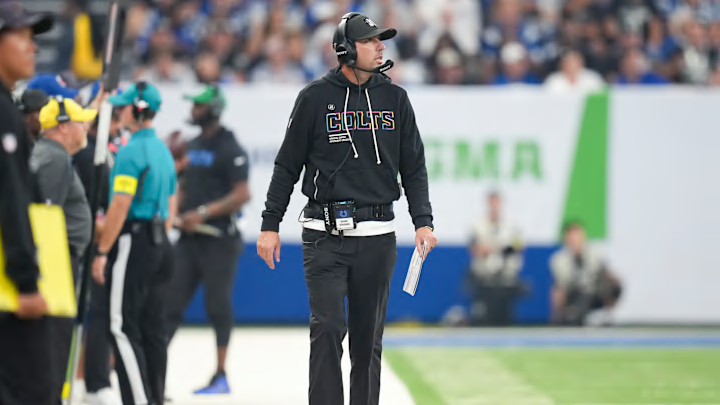What a difference a couple of wins can make. Less than one year ago, after his team was blown out by the moribund New York Giants, Shane Steichen heard the dreaded “C-word. Did the Indianapolis Colts have a culture problem?
“Culture” has become a watchword in the modern NFL. Sure, you need good players and good coaches. But more than anything, you need a good culture. The exact meaning of the term varies depending on who is using it, but it generally applies to the professionalism and the work habits of a roster of players.
Last year, there were stories about a lack of accountability when players would be late or not stay focused at practice. That can be hard to see from the outside, but what was obvious was the sniping. Players were publicly airing their complaints, and no team, business, or family ever wants that. (Unless you are in the reality TV field – then, it’s all good.)
Shane Steichen seems to have turned around the Indianapolis Colts' culture problem
Several players, mostly on the defensive side of the ball, spoke publicly last season about their frustration. Benching quarterback Anthony Richardson in favor of veteran Joe Flacco was not universally accepted, and when Flacco failed to deliver a playoff spot, the floodgates opened.
The most pointed criticisms surrounding the club’s culture came from starting free safety Julian Blackmon. Blackmon had been one of the young players around whom the Colts were intending to build their defense.
But his comments – which took direct aim at Indy’s struggling offense – seemed to cross a line. Chris Ballard made no attempt to re-sign the safety, who departed via free agency for New Orleans.
Shane Steichen, of course, denied that there was a problem. What else could a head coach say? Culture problems begin at the top. Admitting to one means admitting that team leadership is not doing its job.
Steichen had witnessed this before. During his decade-long climb up the coaching ladder with the Chargers, he served under three different head coaches. Virtually every year, the Chargers were labelled as underachievers, and invariably, questions about culture cropped up.
When he joined Nick Siriani in Philadelphia, he still heard grumbling despite Siriani’s unprecedented success. But that’s just the nature of the Philly fan. If they aren’t complaining, they aren’t having any fun.
Indy and Philly are different cities. In Indianapolis, fans’ frustration grew out of the fact that their team had once been dominant. By the time Steichen arrived, those days seemed well in the past.
Desperation leads to short fuses and losses like the one to the Giants last year can ignite a firestorm. As can Pat McAfee, who seemed to confirm that there was indeed a serious culture problem at play with his former team.
Through it all, Steichen seemed nonplussed (in its American usage). He knew he had a good roster. He recognized he had a talented young quarterback whom he had not been able to coach up to professional standards. Thus, he knew a change had to be made at the most important position. He may have been the only one who seemed to know that Daniel Jones would turn out to be the answer.
The Colts’ roster is not radically different from the one that has underperformed the last several seasons. Aside from the quarterback, most of the other major newcomers have arrived from teams that are generally consider to have solid cultures – Charvarius Ward from both San Francisco and Kansas City, Camryn Bynum from Minnesota, Tyler Warren from Penn State.
Those are winning franchises.
But some of the “newcomers” are Colts, born and bred. Tanor Bortolini and Matt Goncalves have stepped into bigger roles on the offensive line after being drafted by Chris Ballard in 2024. If there was a bad culture, it didn’t appear to rub off on them.
That’s because there really wasn’t a bad culture. There was poor quarterback play and coaching that perhaps did leave something to be desired. But this team also had Jonathan Taylor, Quenton Nelson, Zaire Franklin, and Michael Pittman. Those are strong character leaders. If there were a culture issue, they would address it.
There was plenty of frustration in Indianapolis in recent years, but it was born primarily out of uncertainty at the quarterback spot. That is true of almost every underperforming team in the league. That culture question seemed to vanish as soon as the team acquired more talent.
It’s amazing how often that is the case.
